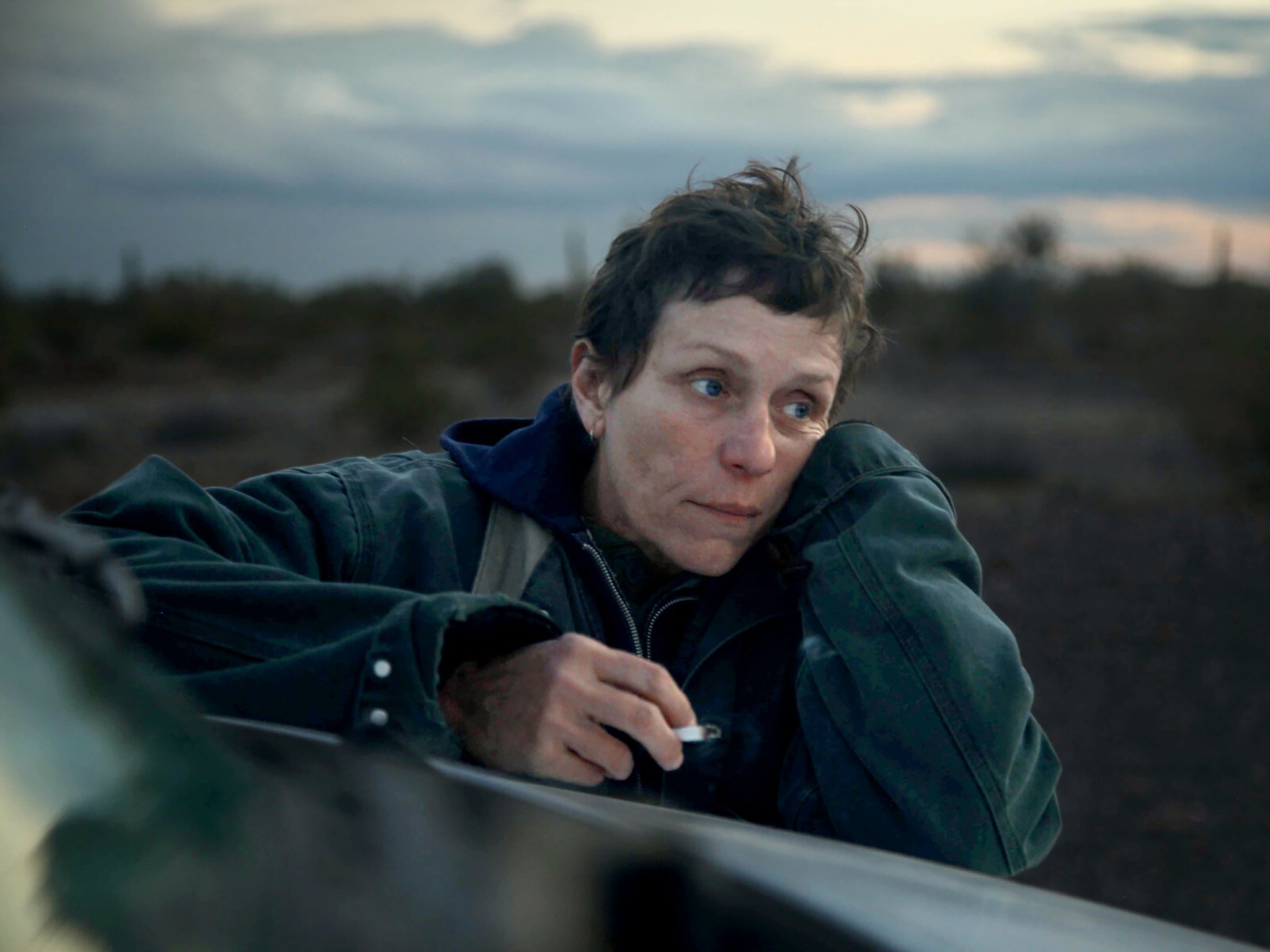Nomadland: Why Chloé Zhao’s anti-capitalist odyssey was the right Best Picture winner
As it takes Best Picture at the Oscars, Adam White argues why the meditative road movie was a worthy winner – and why that Amazon controversy is absurd


Your support helps us to tell the story
From reproductive rights to climate change to Big Tech, The Independent is on the ground when the story is developing. Whether it's investigating the financials of Elon Musk's pro-Trump PAC or producing our latest documentary, 'The A Word', which shines a light on the American women fighting for reproductive rights, we know how important it is to parse out the facts from the messaging.
At such a critical moment in US history, we need reporters on the ground. Your donation allows us to keep sending journalists to speak to both sides of the story.
The Independent is trusted by Americans across the entire political spectrum. And unlike many other quality news outlets, we choose not to lock Americans out of our reporting and analysis with paywalls. We believe quality journalism should be available to everyone, paid for by those who can afford it.
Your support makes all the difference.The best movies about America aren’t made by Americans. They’re made by foreigners and visitors, who arrive in the United States as curious outsiders capable of cutting through the myths presented to them.Nomadland, directed by the Chinese filmmaker Chloé Zhao, is part of a long lineage of non-American American art, from Wim Wenders’ Paris, Texas to Andrea Arnold’s American Honey. It grapples with grief, the betrayals of capitalism, and the lure of the open road. It’s the greatest film of the year, and the right choice for Best Picture.
Fern (a wry and friendly Frances McDormand) was once comfortable. She and her husband lived in Empire, a small town in Nevada sustained by a single employer. Then the employer, a sheetrock manufacturer, pulled out of the town, sending it into total collapse. Fern’s husband got sick shortly after, then died. In the absence of available work, Fern decided to become a nomadic van-dweller, someone who drives from state to state and survives via odd jobs on the road. There, she finds a community of houseless drifters – the majority of them in their retirement years, and all of them exhausted by the everyday horrors of late capitalism.
The stories Fern hears, from fellow nomads also looking for a new kind of freedom, aren’t unique. One woman recalls hitting 62 and discovering she had accumulated just $550 a month for her retirement, despite having worked since she was 12 years old. Another tells the story of a friend who died from liver failure a week before he was due to stop working, and how he never got to use the sailboat he had bought for himself as a retirement gift. “So I retired as soon as I could,” the woman says. “I didn’t want my sailboat to be out in my driveway when I died. And it’s not. My sailboat’s out here in the desert.”
Zhao’s images of those deserts and landscapes inspire awe. There’s striated rock, grandiose redwood trees and purple sunsets. Plastic artifice often interrupts the natural wonder – an enormous model of a brontosaurus at a rest stop; a miniature version of Mount Rushmore for passers-by to pose with; the colossal Amazon warehouse where Fran and many of her fellow travellers find seasonal work.
The film’s depiction of Amazon has sparked controversy, with critics claiming that the film doesn’t go far enough in condemning the company for its business practices or expounding on the perils of gig labour. It’s a bizarre reading of the film, though. At the Amazon fulfilment centre, Fran works alongside the elderly to pack endless boxes for shipping. It’s the only work that many can get – and much like the sheetrock manufacturer that once employed Fran’s husband, Amazon too could up and leave with little consequence, leaving the local economy depleted and hundreds of transient employees without jobs.
Does Nomadland finger-wag at Amazon? No. Does it suggest that capitalism holds a perpetually unstable workforce in its grips, even when that workforce is composed of people who’ve more or less departed conventional life? Absolutely. “It would be very easy for me to have said ‘Amazon’s evil’,” Zhao told The Telegraph in March. “While going after it could make me popular on Twitter, I’d rather look deeply at the structural issues that mean people Fern’s age have to work there.” For anyone to view Nomadland as a kind of pro-Amazon fantasia would feel like a wild misunderstanding of what the film is doing.
Zhao smuggles all of this into a movie that otherwise has a lightness of touch. McDormand is wonderfully salty, as are the friends she meets along the way. They’re often played by real nomads, yet with stories that blur between fact and fiction. It doesn’t matter if some are more fictitious than others – they’re someone’s story, or a living memory from one of those brave people who once ventured out into the unknown. Nomadland is a snapshot of modern America, its aches and traumas, and the individuals trying to make the most out of the bill of goods they’ve been sold.
We may earn commission from some of the links in this article, but we never allow this to influence our content.
Nomadland can be streamed on Disney+ (via Star) in the UK from 30 April, and is in UK cinemas from 17 May




Join our commenting forum
Join thought-provoking conversations, follow other Independent readers and see their replies
Comments